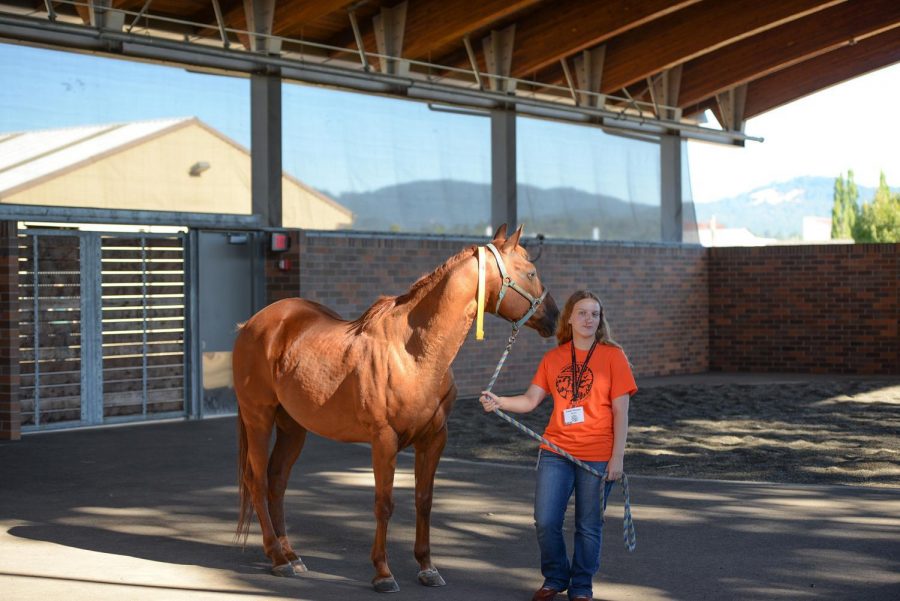Summer Veterinary Experience teaches youth about science, college
August 28, 2017
A line of high school students anxiously peek around each other, looking toward the large, brown animal standing ahead of them. His name is Razor, an older horse owned by the Oregon State University College of Veterinary Medicine. The students step forward one at a time, cautiously taking an acupuncture needle from the supervising veterinarian and quickly tapping it into the animal’s skin. As Razor sighs and relaxes, the students smile in satisfaction.
Twenty-four high school students attended the OSU Summer Veterinary Experience to learn about professions in the veterinary field and to also experience life on a college campus. This program is in its sixth year and is led in part by professional students in the OSU College of Veterinary Medicine. The program, which took place from Aug. 13-18, is geared toward underrepresented minorities who are considering careers in veterinary medicine. Interest in the program is continuously growing, according to Tess Collins, the coordinator of the Summer Veterinary Experience.
Susan Tornquist, the dean of the OSU College of Veterinary Medicine, explained that the program was designed to show high school students what veterinary school is like.
“We recognized that applications for vet school included a low number of underrepresented minorities,” Tornquist said. “We wanted to introduce people to the profession at a relatively early age. We thought we would target high school students going into tenth and eleventh grade, and people who might not think of veterinary medicine as a profession.”
According to Collins, the program initially had ten participants, but it has since expanded to 24 participants this summer due to the large number of applicants.
“Really, the main goal was to provide an opportunity for some of these students who wouldn’t have otherwise been able to learn about veterinary medicine and college,” Collins said.
During the week-long camp, the participants attended informational sessions with professors and observe different procedures, according to Collins.
“They learned to do a physical exam on a dog; they learned some surgical skills, like suturing,” Collins said. “Another session involved learning the basics of equine acupuncture. That’s a fun one to see.”
The participants also worked on research projects at the veterinary school, Collins noted. These projects included research topics such as identifying diseases within DNA, genotyping mice and measuring immune responses in cheetahs and elk.
“The students were assigned to a research lab with faculty members of the College of Veterinary Medicine,” Collins said. “They spent eight hours getting involved with research projects.”
Participants are mentored throughout the week by veterinary students in the professional program in the College of Veterinary Medicine, according to Tornquist.
“They are good mentors for high school students because they’re not that much different or much older,” Tornquist said.
Emily Mangan, a professional student in the College of Veterinary Medicine, participated as a student mentor for the second time.
“Each and every student is on their own journey through life, and being a part of their individual journeys—even if only for a week—revitalizes my love for humanity, for teaching and for science,” Mangan said in an email.
According to Mangan, this program is a valuable part of OSU because it encourages interest in college.
“I think every young person deserves the opportunity to grow and explore their world,” Mangan said in an email. “OSU is our state school, a land grant university and home to the only college of veterinary medicine in Oregon, and I believe it is our duty to provide students in Oregon and beyond the opportunity to pursue their interests in STEM careers.”
The cost of the program is $750, including meals and a room in a residence hall. Full scholarships are offered to eight students who come from low-income families, ethnic or cultural backgrounds underrepresented in the veterinary field or who are first-generation college students, according to the OSU Summer Veterinary Experience webpage. Collins said they also take into consideration the essay responses on the program applications.
At the end of the program, the participants are reunited with their families on campus, according to Collins.
“The groups put on a presentation about what they learned and present that to their families,” Collins said.
Mangan said the camp’s participants are enthusiastic about their research-related experiences in the program.
“It is thrilling to see the amount of growth of knowledge of scientific theory, communication and camaraderie that these students are capable of every day,” Mangan said in an email.
























































































































